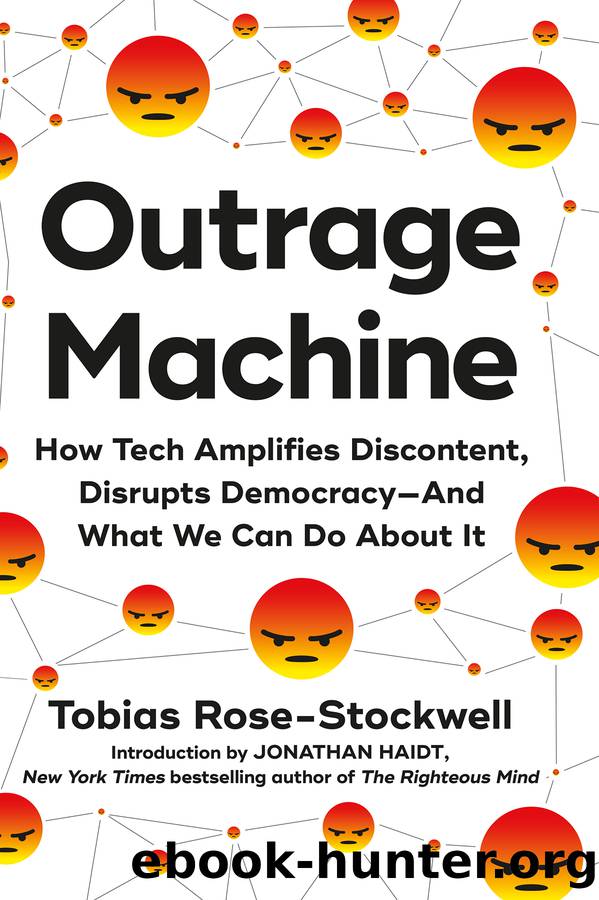Outrage Machine by Tobias Rose-Stockwell

Author:Tobias Rose-Stockwell [ROSE-STOCKWELL, TOBIAS]
Language: eng
Format: epub
Publisher: Grand Central Publishing
Published: 2023-07-12T00:00:00+00:00
PART III
History of the Machine
Chapter 16
The Ancient History of Virality
Our species has been around for a long time.
For most of human history, knowledge would just dissolve. Terrible atrocities, wars, massacres. Incredible heroism and profound triumph over struggle. Whole languages, cultures, and peoples could be subsumed by another. All was forgotten.
This knowledge would not stick, because there was no medium upon which to attach it. Names, faces, events, could be retold as oral histories, but they would not remain for long. Only some would transit forward in time for a handful of generations before they, too, were absorbed into myth, or lost forever.
Until we could write, we could not record. Until we could print, we could not compare.
Understanding the history of our species is like looking backward into a picture frame that holds tiny scraps of a long-faded image. We can make out the rough outline of human forms. We cannot see faces, distinct features. The image has dissolved, and we must infer and apply our own interpretations to their lives and struggles.
But what we do know is that across all cultures, everywhere on earth, humans have a desire to learn and share news. Our ancestors lived in an information-poor world, and had few ways of exposing themselves to new knowledge. Because of this, our brains might have evolved to crave novel information in much the same way we crave sugar. Both were helpful for our survival, and both were rare in nature.
For much of our past, up-to-date knowledge was also a matter of life and death. It helped us understand where danger was, whom to trust, and what to avoid. The news was a ritual of exchange, not just a commodity to consume. The origin of the word news is quite literal: Itâs the plural of the ânewâ thing(s) people know about and pass along.1
The ancient world was smaller not just in terms of populace, with a global population a tiny fraction of what it would become in the Industrial Era (most of the largest cities on earth had far less than one hundred thousand people), it was also smaller in terms of perspective.2 Most of the world was basically invisibleâa vision incomplete and fleeting. Life was slow, cyclical, tedious, and local. Any news was a glimpse of the unknown.
In rural areas, when a traveler carrying news arrived, it might be the most significant informational event of the year. A piece of written parchment or a letter, read aloud in public, was a new window into a foreign world, an alternate reality. News of major events traveled shockingly slowly. Like light emitted from a far-off star, the view of an occurrence was only known long after it occurred.
The story of civilization is the story of slowly evolving news networks. Each network was painstakingly built and improved over centuries, influenced by every fledgling technology that improved the transit of knowledge.
This knowledge was about power. The faster and farther news could spread through these networks, the easier it was for rulers to rule.
Download
This site does not store any files on its server. We only index and link to content provided by other sites. Please contact the content providers to delete copyright contents if any and email us, we'll remove relevant links or contents immediately.
Learning SQL by Alan Beaulieu(5428)
Weapons of Math Destruction by Cathy O'Neil(5050)
iGen by Jean M. Twenge(4708)
Digital Minimalism by Cal Newport;(4573)
Sapiens by Yuval Noah Harari(4558)
Elon Musk by Ashlee Vance(3463)
The Age of Surveillance Capitalism by Shoshana Zuboff(3434)
Thing Explainer by Randall Munroe(3337)
Apollo 8 by Jeffrey Kluger(3206)
Future Crimes by Marc Goodman(3009)
The Science Book (Big Ideas Simply Explained) by DK(2755)
Who Can You Trust? by Rachel Botsman(2736)
I Live in the Future & Here's How It Works by Nick Bilton(2534)
Infinite Energy Technologies by Finley Eversole(2497)
Steve Jobs by Walter Isaacson(2443)
Dawn of the New Everything by Jaron Lanier(2443)
Chernobyl by Serhii Plokhy(2137)
Energy Myths and Realities by Vaclav Smil(2069)
Ben Franklin's Almanac by Candace Fleming(2065)
